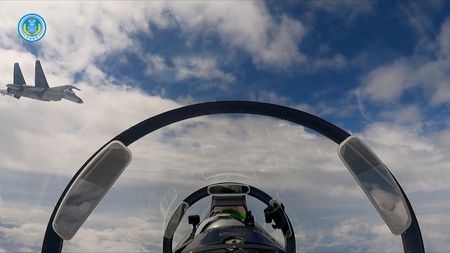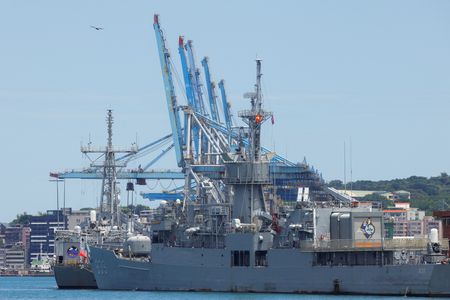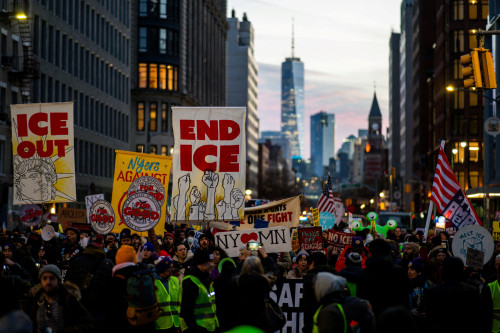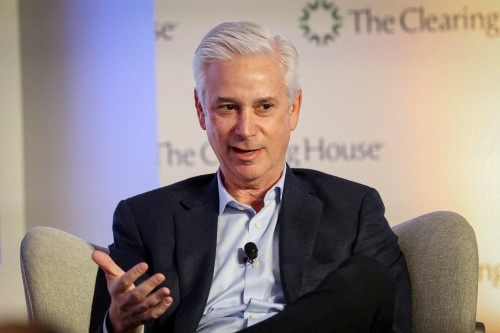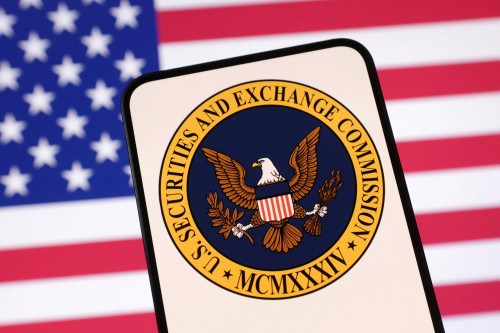By Casey Hall and Ben Blanchard
SHANGHAI/TAIPEI (Reuters) -China launched military drills around Taiwan on Saturday as a “serious warning” to separatist forces in an angry but widely expected response to Vice President William Lai’s visit to the United States, drawing condemnation from Taipei.
Lai, the front-runner to become Taiwan’s president in elections in January, returned from the United States on Friday. He officially made only stopovers on his way to and from Paraguay but gave speeches while in the U.S.
China views democratically governed Taiwan as its own territory, despite the strong objections of the island’s government.
The People’s Liberation Army’s Eastern Theatre Command said in a brief statement it was carrying out joint naval and air combat readiness patrols around the island.
Taiwan’s defence ministry said it had detected 42 Chinese aircraft and eight ships involved in drills around the island from Saturday morning and that it had deployed ships and aircraft in response.
Twenty-six Chinese aircraft crossed the median line of the 100-km (60-mile) wide Taiwan Strait, or areas beyond each end of the line, the ministry said in a statement. For decades, the line served as an unofficial barrier between the two militaries.
The PLA’s Eastern Theatre Command said it was holding joint exercises and training of naval and air forces, focussing on ship-aircraft coordination, seizing control and anti-submarine drills to the north and southwest of Taiwan to test the forces’ “actual combat capabilities”.
“This is a serious warning against Taiwan independence separatist forces colluding with external forces to provoke,” it said.
‘NORMAL DIPLOMATIC INTERACTIONS’
The command released video footage purportedly taken on Saturday, showing J-16 and J-10 fighter jets and a naval destroyer on patrol.
In text accompanying the footage, set to a thumping orchestral score, it said the drills were to “test the actual combat capabilities of joint operations of forces in the theatre”.
Equipment deployed included destroyers, frigates and fast attack missile boats as well as fighters, early warning and jamming aircraft that “assembled in a predetermined area”, it said, without giving details.
The forces carried out “omnidirectional encirclement of the island”, the command said.
Taiwan’s government strongly condemned the drills, with the defence ministry saying it had the ability, determination, and confidence to ensure national security.
The government’s Mainland Affairs Council, which makes Taiwan’s China policy, urged Beijing to stop its intimidation and start talks, saying Taiwan’s people were determined to defend themselves and would never succumb to threats of force.
“The Republic of China, Taiwan, is a sovereign country and has a legitimate and legal right to conduct normal diplomatic interactions with friendly countries,” it added in a statement, using the island’s formal name.
A U.S. State Department spokesperson urged Beijing to “cease its military, diplomatic, and economic pressure against Taiwan and instead engage in meaningful dialogue,” adding that the U.S. would continue to monitor the exercises closely.
Taiwanese officials had said China was likely to conduct military exercises near the island this week, using Lai’s U.S. stopovers as a pretext to intimidate voters ahead of next year’s presidential election and make them “fear war”.
Taiwan Foreign Minister Joseph Wu wrote on the X social media platform, previously known as Twitter, that China has made it clear it wanted to shape the island’s election, but it was up to Taiwan’s people to decide, “not the bully next door”.
“Look, China should hold its own elections; I’m sure its people would be thrilled,” he added.
Taiwan’s defence ministry released a short video of undated footage showing Taiwanese forces at sea, on city streets and across the countryside. Also set to orchestral music, the video was titled “firmly defend the defend national sovereignty and protect democratic freedom and people’s security!”
Hours before the drills, U.S. President Joe Biden and the leaders of South Korea and Japan agreed at Camp David to deepen defence and economic cooperation, while reaffirming “the importance of peace and stability across the Taiwan Strait as an indispensable element of security and prosperity in the international community.”
‘FEAR WAR’
The full extent of Saturday’s manoeuvres was not immediately clear, and there was no sign of alarm on the streets of Taiwan, which has long been used to China’s threats.
“I don’t think there will be war, I am unafraid,” said university student Chou Yu-hsuan, 20.
Regional defence attaches and analysts were scrutinising the scale and intensity of the operations, seeking to gauge them against intensive Chinese war games in August 2022 and April this year.
After the then-speaker of the U.S. House of Representatives, Nancy Pelosi, visited Taipei last year, China’s military fired missiles over Taiwan, some landing in Japan’s exclusive economic zone, and staged naval drills around the island in what Taiwanese officials described as preparations for a full invasion.
The April drills came after President Tsai Ing-wen met House Speaker Kevin McCarthy on a stopover in California.
A senior Taiwan official familiar with security planning told Reuters that unlike in April, China had not named the current drills and had waited until after the Camp David summit to carry them out in a sign that China wants to “reduce direct confrontation” with the international community.
China has a particular dislike of Lai for his previous comments that he was a “practical worker for Taiwan independence”. On the campaign trail, however, he has pledged to keep the status quo and repeatedly offered talks with Beijing.
Beijing’s confirmation of drills was accompanied by a volley of state press articles condemning Lai, with the official Xinhua news agency branding him “Lai the liar”.
Shortly before the military’s announcement, the Taiwan Work Office of China’s ruling Communist Party said Lai’s U.S. stopovers were “a disguise he used to sell out the interests of Taiwan in order to seek gains in the local election through dishonest moves”.
The United States, like most countries, has no formal ties with Taiwan but is its strongest international backer, bound by law to provide the island with the means to defend itself.
(Reporting by Casey Hall, Ben Blanchard, Fabian Hamacher, Yimou Lee and Michael Martina; Writing by Greg Torode; Editing by William Mallard, Kim Coghill and Deepa Babington)

